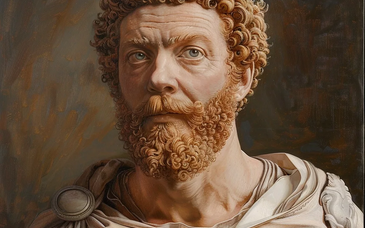Lectures
- The Geography of Italy
- The Etruscans
- The Roman Republic
- Roman Expansion and the Punic Wars
- The Civil War
- The Rise of Julius Casear
Instructional Goal: Students will know the facts surrounding the rise of Julius Caesar to power and understand how he transformed Rome into an empire.
I. With Marius and Sulla removed from Rome, a power vacum develops.
- Three influential Romans rise to challenge for the leadership of the Roman government.
- Pompey (106-48 BC); A patrician optimate, he was one of the most influential men in Rome. He had very deep support from the Roman senate.
- Crassus (112-53 BC); Also a patrician optimate, but with less support among the senate. He was Sulla's protege and a military hero as a result of the suppression of the Slave revolt led by Spartacus in 73 BC. He was considered the wealthiest man in Rome.
- A populare and nephew of Marius, he was also a member of the one of the oldest families in Rome. He was opposed by the Senate and was a close friend of Crassus.
II. The three Romans reach a compromise and rule Rome as the "First Triumvirate."
- Pompey and Crassus were the consuls of Rome.
- In a surprise move, they repealled many of Sulla's reforms and stripped much of the power from the senate.
- In an attempt to placate the populares, Pompey and Crassus decide to make Julius Caesar a Consul without power.
- Although officially part of the government, Caesar did not trust Pompey or Crassus.
III. Julius Caesar decides to leave Rome for a foreign outpost.
- Caesar appoints himself Proconsul of Gaul.
- Action was designed to remove himself from Roman politics and also recruit a loyal army much as Marius had done.
- Caesar meets limited success in Gaul but eventually brings it under Roman control by 55 BC.
- He sends continuous dispatches back to Rome. These become known as the "Commentaries on the Gallic War".
- Caesar attempts to invade and conquer Britain but he is driven out by the Celts.
IV. Julius Caesar returns to Rome and achieves total control of the govenment.
- Crassus meets an unexpected death during a military campaign in Syria in 53 BC.
- Pompey declares himself sole Consul and orders Caesar to disband his army and return to Rome.
- Caesar begins a march on Rome with his army intact.
- He is warned not to "Cross the Rubicon" but he disobeys, stating "The die is cast."
- The common people of Rome are obvious in their support of Julius Caesar and even many optimates desert Pompey when it becomes obvious he cannot defeat Caesar.
- Pompey flees Rome and is followed by Caesar.
- He is eventually chased to Egypt, where Caesar follows him, has him executed, and assists Cleopatra in her effort to gain the throne of Egypt.
V. Julius Caesar establishes a dictatorship (49-44 BC).
- Julius Caesar becomes a "Demogogue", or one who makes use of popular prejudices and false claims and promises in order to gain power.
- In a series of political moves, Caesar gains total control of the Roman government; (A) Appointed dictator for 10 years; (B) Appointed dictator for life; (C) Assumed title of "Imperator" or a general in a perpetual state of triumph; (D) Assumed the title of "Pater Patriae" or "Father of his Country".
- Caesar wisely turned down the title of King, a hated title since the days of the Tarquins.
VI. Julius Caesar implements a series of reforms designed to further consolidate his power.
- He granted citizenship to many colonials, thus widening his base of support.
- Granted pay to Proconsuls to remove corruption and gain allegiance from them.
- Established a network of spies.
- Instituted a policy of land reform designed to take power away from the wealthy.
- Reduced the powers of the Senate so as to make it an advisory council only.
VII. Caesar's reforms create a deep hatred from the wealthy and powerful senate.
- The large masses grow in their support of Caesar.
- At the same time the senate fear his reforms and attempt to convince the people he was on the verge of restoring the kingship.
- The senate despised him because of his personal actions including (A) Having his head placed on the coin of the realm; (B) having himself proclaimed a descended of Romulus and Remus; (C) Assuming the oriental dress of the Egyptians; (D) Establishment of a religious cult which many thought would lead to his self-proclaimed divinity.
- A group of senators, led by Cassius and Brutus, who some suspect was Caesar's illegitmate son, plot to assassinate Caesar.
- Despite many warnings, Caesar enters the Senate chamber on March 15 (The Ides of March), 44 BC and is stabbed over 60 times.
Assignment: Students will read "The Assassination of Julius Caesar."





